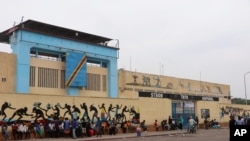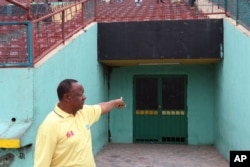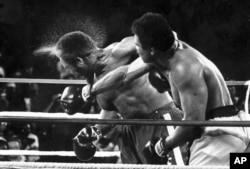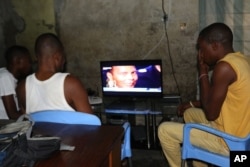Admirers of Muhammad Ali in the Democratic Republic of the Congo — where one of his most famous fights, the Rumble in the Jungle, took place — are mourning the death last Friday of the former world heavyweight boxing champion and influential social activist.
Franklin Katunda, a Congolese now living in the United States, was just 5 when his father took him to Tata Raphael Stadium in Kinshasa, the venue where challenger Ali faced off against undefeated world champion George Foreman.
“We use to live close to the airport, and I remember my dad and I waiting along the airport route to greet him," Katunda said. "I remember Ali sitting on top of a car. There were a lot of policemen and other people escorting him, and the crowd was all over the place. It was unbelievable.”
"We were used to that kind of welcoming when heads of states visited,” Katunda said. At the time, though, the boy thought, "He’s not even a head of state.”
'A great entertainer'
Katunda said he remembered his dad telling him that Ali was from the United States. He said that didn’t matter in the mind of a kid: “All I saw was a tall black man that looked just like any other Congolese who was there for a boxing match.”
Katunda said Ali "was out there just praising himself, saying a lot of stuff as to how he’s going to beat Foreman. We didn’t really understand English, but he was just a great entertainer, and you knew when he starts talking, everything is gonna go down.”
Prior to the match, Ali told reporters, “Last night I had a dream: When I got to Africa I had one hell of a rumble. I had to beat Tarzan's behind first, for claiming to be King of the Jungle. For this fight, I’ve wrestled with alligators, I’ve tussled with a whale. I done handcuffed lightning and thrown thunder in jail. You know I’m bad. Just last week, I murdered a rock, injured a stone, hospitalized a brick. I’m so mean, I make medicine sick. I am so fast that I can run through a hurricane and not get wet. When George Foreman meets me, he’ll pay his debt.”
Katunda doesn’t remember specific things from the fight; he said he recalled only the ring in the middle of the stadium and the sheer number of wildly enthusiastic people.
Something else will stay with him forever: the famous “Ali Bomaye” song, which meant “Ali Fight Him” or “Ali Kill Him” in the local Lingala language.
“I will always remember that fight as Ali putting Africa on the map," Katunda said, "because agreeing to fight in a country that many had never heard of in the U.S. was an amazing decision.” And he continued to relive the moments long after the fight was over.
Boldness remembered
Katunda, who has been living in the U.S. for 17 years, said that “when I think of Ali, I see, first of all, he’s got the attitude that I have. He questions things. He wants to know why certain things are done this way and that way. He’s an activist. He’s the voice of those people who don’t talk much. He’s the voice of people who have no voice.”
Xavier Ntete, 50, also attended the Rumble in the Jungle. He was 8.
"Muhammad Ali was a talented boxer," he said. "He came to Kinshasa to train. He had easy contact with young people and children. He made them sing. We felt he was close to us.”
Ntete recalled that Foreman was the favorite to win the bout, "because Foreman always ended his matches with a knockout."
"During the match, Ali used the rope-a-dope tactic, used dance, and when he got tired he would lean on the ropes to tire Foreman, because George Foreman had a powerful punch," he said. "He felt that George Foreman was tired in the eighth round. It was at that moment that he gave him the lethal punch. ... When George Foreman fell, the referee counted to 10, and Foreman stood up but it was too late. And Ali was the champion again. He recovered the heavyweight championship that he lost.”
'The greatest of all time'
After the fight, Ali exclaimed to reporters, "I told you, all of my critics, I told you all that I was the greatest of all time when I beat Sonny Liston. I told you today I'm still the greatest of all time.”
Florent Lungasilu, 68, was also among the estimated 60,000 fans who watch the fight in Kinshasa in 1974. "I was a fan of Foreman, but I also knew that Muhammad Ali was on another level," he said. "He was a great boxer and he proved it until his death."
Today, Ali's legacy and impact in the country can be seen in places like the Muhammad Ali Keep Your Head High Boxing Club near Tata Raphael Stadium.
"I am a boxer today because I was inspired by Muhammad Ali," Modestine Munga said. "I used to watch the Rumble in the Jungle match all the time. I studied Ali's boxing style, which inspired me a lot. ... There are no other boxers like Ali."
James Katambwa contributed to this report from Kinshasa for VOA's French-to-Africa service.







